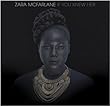 By Daniel Garrett
By Daniel Garrett
Zara McFarlane, If You Knew Her
Brownswood Recordings, 2013
(Released 2014)
Zara McFarlane’s If You Knew Her begins with the beautifully spare arrangement given “Open Heart,” and McFarlane’s singing intense and sensual as well as clear and precise, declaring “an open heart is both a lock and key.” With jazz percussion, sparkling and strong piano playing, and a lightly rhythmic vocal approach, “Her Eyes” is conversational, fresh, pretty. Within the pleasantly firm rhythm of “Move,” a girlish delicacy delivers lyrics of quest, doubt, and determination: “If you find me, I’ll be on my knees trying to be me,” supplication before another being’s heart and soul. An acoustic guitar is discernible in “You’ll Get Me in Trouble,” in which McFarlane repeats the word “trouble” many times at the prospect of dangerous infatuation. There is a restrained, thoughtful interpretation despite the romantic wariness: a very natural atmosphere is created, easily entering the mind.
There is a very likable rendition of “Police and Thieves,” a popular song about the disturbing violence of policemen going about their work chasing criminals: charming, contemplative, a melodious jazz treatment. “Spinning Wheel” contains wordless singing. There is what sounds like a double-tracked vocal introduction to the darkly haunting “Plain Gold Ring,” with a ring as a sign of commitment in a melancholy declaration of love for what appears to be a married man: “In my heart it will never be spring as long as he wears the plain gold ring.” There is a full arrangement, quite busy, with a blasting horn, for “Angie La La,” in which a male voice (Leron Thomas), half-singing, half-speaking asks, “Where have you been all my life?” The woman narrator had asked the same question. “The Games We Played” is elegantly simple with piano and voice. “Woman in the Olive Groves” creates a scene, dramatic, poetic, of a woman who may be in danger—alluring and observed by dubious men. Somber and delicate, the somewhat long “Love” calls for more than one kind of attention—“love paint me on your canvas”—and it is full of imagery.
Daniel Garrett, a child of the American south, Louisiana, where he grew up reading, taking photographs, and enjoying fishing and a good summer barbecue, Daniel moved to New York and became a graduate of the New School for Social Research, was an intern at Africa Report, poetry editor for the male feminist magazine Changing Men, founded and acted as principal organizer of the Cultural Politics Discussion Group at ABC No Rio and Poets House, wrote about painter Henry Tanner for Art & Antiques, and organized the first interdepartmental environmental justice meeting at Audubon. Long interested in human complexity, intelligence, experiment, and cultural diversity, Garrett has researched various cultures, and he wrote about fiction and poetry for World Literature Today and international film for Offscreen, and has done music reviews that constitute a history of popular music for The Compulsive Reader.